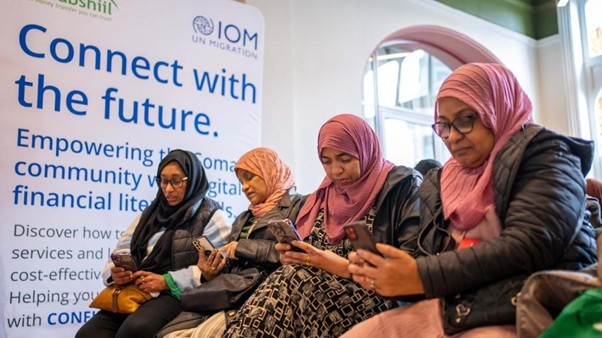Working with Diaspora Communities in the UK to Reduce Remittance Costs

In October 2024, IOM UK conducted a series of remittance workshops in London, in partnership with Somali community organisations WIT and Rise, and the money transfer organisation Dahabshiil. The aim of the workshops was to empower individuals with improved understanding of the availability of digital remittance channels, and enable them to take advantage of cheaper, safer and faster transfer of remittances.
Click here to watch the video in Youtube
International remittances - financial transfers made by migrants to their families and communities back home - are a vital lifeline for millions worldwide. These remittances contribute to food, housing, education, and healthcare in migrants’ countries of origin, while also empowering those who receive them, particularly women. Unlocking the full potential of remittances is crucial to attaining the Sustainable Development Goals (SDGs).
One way to do this is by reducing the average cost of sending remittances closer to the SDG 10.c target of 3%. The International Organization for Migration in the United Kingdom (IOM UK) is implementing a pilot project aimed at lowering remittance costs on the UK-Kenya corridor, by working with diaspora communities in the UK and encouraging the adoption of affordable, efficient digital channels.

According to World Bank data, the average cost of remitting USD 200 from the UK to Kenya is 4.8%, and for cash-based remittances the cost was even higher, averaging over 10%. These costs directly limit the developmental impact of remittances, reducing the financial resources available for household welfare, education, and investment in Kenya. Meanwhile, remittances sent over digital channels were shown to be closer to the 3% SDG target.
With a view to understanding remittance-sending behaviours on the UK-Kenya corridor, IOM UK conducted a rapid assessment which engaged 140 remittance senders. The study initially focused on Kenyan diaspora and later expanded to include members of the Somali diaspora, many of whom also remit to Kenya. The survey findings highlighted the different preferences for remittance sending for the two groups. The Kenyan diaspora were more likely to take advantage of the increased availability of low-cost digital channels, whereas many in the Somali community had a preference for cash-based services which were more expensive.

By working in partnership, the project aims to bring the benefits of affordable, efficient digital remittance platforms to Kenyan and Somali diaspora communities. Through awareness campaigns, community engagement, and policy advocacy, the project promotes the advantages of digital remittances - faster, safer, and more cost-effective financial transfers.


